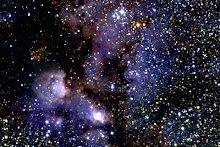The appeal of atheism lies in its explanatory powers and in how it reflects upon my thoughts and feelings. I was not always inclined towards atheism as earlier blog posts can attest to. Rather, I was a very devout theist. I do not begrudge that part of my life or think ill upon it. The explanatory power that theism provided in my life was sufficient to carry me through the proverbial storms of life and in attempting to understand myself. But, like other things in life, I outgrew it and found that its system of explanations could no longer provide sufficient information and therefore turned elsewhere to seek out truth.
I wanted to write this as an attempt to establish the foundational views that I have. See, for me, atheism isn't so much a world view as just a conclusion that I accept on one area of life. Atheism, for me, is not some universal theory that answers everything. Rather, it is a theory that considers only the natural world to exist. So onto the foundational views that I now possess.
First, all that occurs in life is the result of and can be explained by some natural law or phenomenon. The sun rises and falls due to the earth's orbit and the seasons are the result of the earth's revolution around our star. The earth is over several billion years old and this can be determined through isotopic dating. Evolution is an empirically verified theory that can be demonstrated in the lab and is observable in nature. This is the vehicle that can explain the much documented fossils of primitive life.
Second, human actions and reactions are the result of complex interactions that can range from one person to a couple to many to millions to even billions. The existence of morals is the result of evolutionary biological factors, history, geography, social forces, and human thought. The Hammurabi Code can be explained partially by evolutionary biology and can also be explained by the social and historical factors at the time.
Third, while humans have obtained an incredible amount of knowledge about the natural world around us in such a short period of time, we still do not know everything and probably know very little about the world and the universe surrounding us. This is especially clear when time and time again the fields of psychology, political science, and other soft science realms cannot consistently and accurately demonstrate theories with the level of accuracy and consistency that the hard sciences are able to do. In other words, the soft sciences that attempt to explain the phenomenon of humans still do not know or understanding us fully. This inability to explain everything is not something to complain about but to rejoice in! Imagine how dreary the world would be if there was no more knowledge to strive for.
Fourth, I see no evidence to conclude even with reasonable certainty that any of the Gods of Mormonism, Christianity, Islam, Hinduism, Buddhism, Shintoism, Paganism, or of the other religions exist. Further, I do not see any reason to conclude that anything supernatural exists. But, I would like to explain further that I do not state that there is no God or some kind of supernatural force in the universe. I acknowledge that such a possibility, however unlikely, may exist. I see no evidence as of yet to consider such a possibility to be probable or even worth investigating or believing in. It is my own personal opinion, or belief, that, as based on the evidence, there is no such thing as a God or gods. I do not define myself as an Agnostic because I conclude that all things have the potential of being explained by science and philosophy. Therefore, I do not consider God to be beyond the realm of explanation. I consider God to be the invention of the human mind and therefore well within the explanatory powers of the sciences and philosophies of humanity. Definitions of God that place it beyond the capacity of science to explain, seek out, or show empirical evidence for is the equivalent of Russell's Teapot and are unnecessary to interact with, in my opinion.
Fifth, I respect the rights of all people to be able to believe or not believe whatever they wish to believe, or not believe, in. I do not begrudge the willing desire of theists to embrace the notion of the supernatural. I only take issue with the desire of theists to impose their belief system, whatever it is they believe in, upon the whole of the populace. I do not see reason to conclude that religion has the right to impose its own strain of morality upon anyone outside of its belief structure. For example, I do not agree with the LDS Church and its network of friendly faiths that successfully passed Proposition 8 in California in 2008 in imposing their view upon society. Now while I realize that Proposition 8 was a complex issue and the motivations behind it vary from person to person and organization to organization and cannot be diluted down to the point that I have just done, I only meant to explain the situation as perceived by myself: the LDS Church sought to put their beliefs in the sanctity of heterosexual marriage at the expense of homosexual marriage.
Sixth, since removing the theistic notions that assisted in the depression that I experienced last year I see the world around me as beautiful and fully of a vitality that I can barely comprehend. This aestheticism of mine has led me to care more about the natural world around me than I have had in the invisible and unknowable realm of the supernatural.
Subscribe to:
Post Comments (Atom)





No comments:
Post a Comment